Compare the Top 10 Mental Health EHR Software of 2026
Choosing the right EHR for your mental health practice isn’t just a business decision, it’s a deeply personal one. Every session you document, every assessment you track, and every treatment plan you follow impacts real people’s lives. Yet, many clinicians find themselves wrestling with general EHR systems that feel rigid, impersonal, or ill suited to the nuanced world of behavioral health.
This guide is designed to help you navigate that complex landscape with clarity, confidence, and insight, highlighting the top 10 mental health EHR platforms, so you can focus on what truly matters: delivering compassionate, effective care.
Key Considerations for Mental Health EHRs
When evaluating an EHR for behavioral health, practices should prioritize:
- Clinical Documentation and Assessment Tools: Customizable templates for therapy, psychiatry, and group sessions, aligned with DSM-5 and ICD-10 standards.
- Telehealth and Virtual Care Integration: Secure, HIPAA compliant audio/video platforms with session documentation and interactive features.
- Outcome Measurement and Longitudinal Tracking: Support for PHQ-9, GAD-7, and other validated instruments, with dashboards for treatment progress and compliance reporting.
- Billing and Revenue Cycle Management: Seamless insurance claims, CPT/ICD-10 coding, electronic submission, and automated reminders.
- Data Security and Compliance: Advanced encryption, role based access, granular audit trails, and support for federal privacy regulations
- Scalability and Workflow Flexibility: Tools that evolve with solo practices, multi provider clinics, and large behavioral health agencies.
Mental Health EHR Comparison Table
|
EHR Platforms |
Pros |
Cons |
|---|---|---|
|
AI-powered charting, telepsychiatry suite, RPM, scalable multi-site solution |
Steeper learning curve, setup time | |
|
Fast, structured notes, psychiatry and therapy templets |
Outdated UI, optional add-ons | |
|
Offline access, AI-assisted documentation, outcome assessments |
Limited customization | |
|
Intuitive UI, mobile-ready, telehealth integrated |
Less robust for large clinics | |
|
Group therapy support, automated workflows, outcome tracking |
Learning curve, pricing opaque | |
|
Scalable for agencies, multi-service EHR |
Complexity for small practices | |
|
Affordable, therapy-focused, mobile-friendly |
Limited advanced features | |
|
Unified EHR + billing, cloud access |
Less specialty-specific depth | |
|
Advanced analytics, population health tools |
Enterprise-focused, costly | |
|
Multi-program support, robust reporting |
Complex setup, training required |
Top 10 Mental Health EHR Platforms
1. OmniMD Mental Health EHR

OmniMD is not just an EHR, it’s a digital sanctuary for mental health professionals. Founded in 2001, OmniMD has evolved from a healthcare tech provider into a leader in behavioral health innovation, offering AI powered charting, telepsychiatry, and patient centric workflow automation.
- Prominent Features:AI-Charting: Converts session recordings into structured notes, reducing documentation time by up to 70%.
- Conditional Templates: DSM-5 aligned templates with logic driven auto population.
- Telepsychiatry Suite: HIPAA-compliant, multi modal sessions with interactive therapeutic tools.
- Remote Patient Monitoring: Tracks mood, sleep, and anxiety trends via wearable integrations.
- Enterprise Grade Security: Granular access control, data masking, and full audit trails.
OmniMD is particularly suitable for multisite clinics, hospitals, and large group practices, offering scalability without compromising on mental health specificity.
2. TherapyNotes
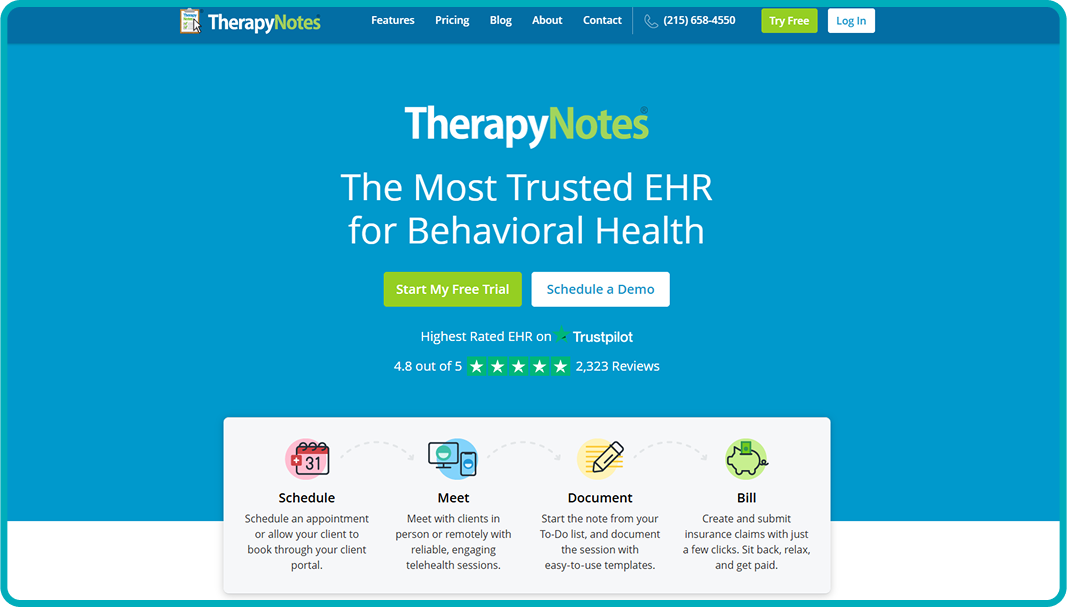
Founded in 2010 by a licensed clinical psychologist, TherapyNotes was designed from scratch for behavioral health. Its offline access makes it ideal for rural or low connectivity environments.
Prominent Features:
- AI assisted documentation (TherapyFuel Scribe)
- Automated outcome assessments (PHQ-9, GAD-7)
- Integrated scheduling and billing
- Secure patient portal
3. SimplePractice
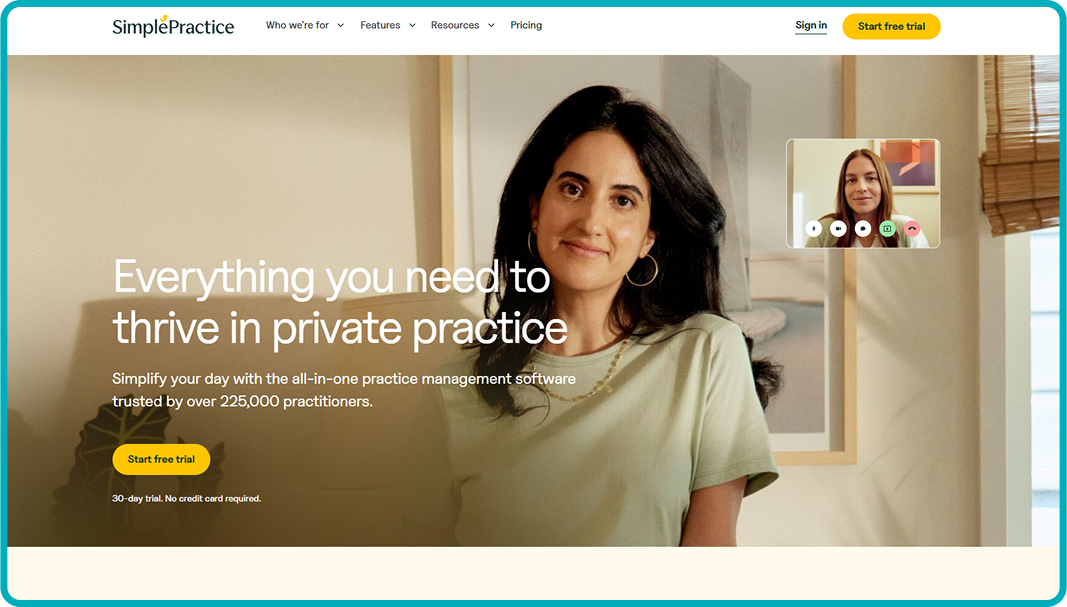
SimplePractice combines an intuitive interface with mobile optimized workflows, making it popular among solo and small group practices.
Prominent Features:
- Builtin telehealth with one click access
- Patient self scheduling and mobile portal
- Paperless insurance claim setup
- Customizable client paperwork
4. ICANotes
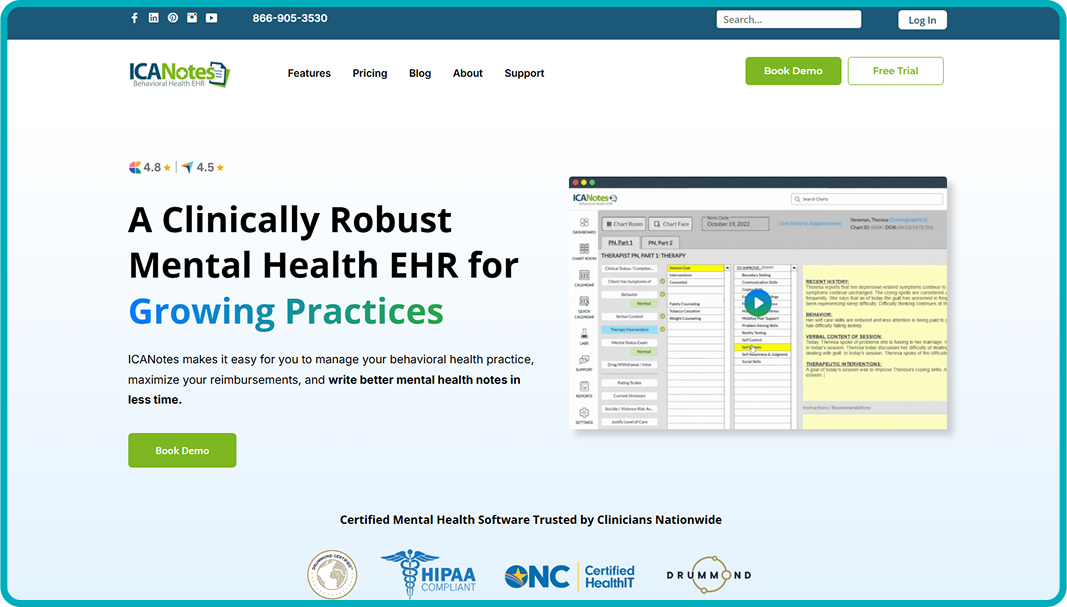
ICANotes originated as a psychiatrist focused note generator and evolved into a full EHR, emphasizing structured, narrative rich documentation.
Prominent Features:
- Point and click psychiatric templates
- Integrated practice management and scheduling
- HIPAA-compliant telehealth
- Inter provider care coordination
5. Valant
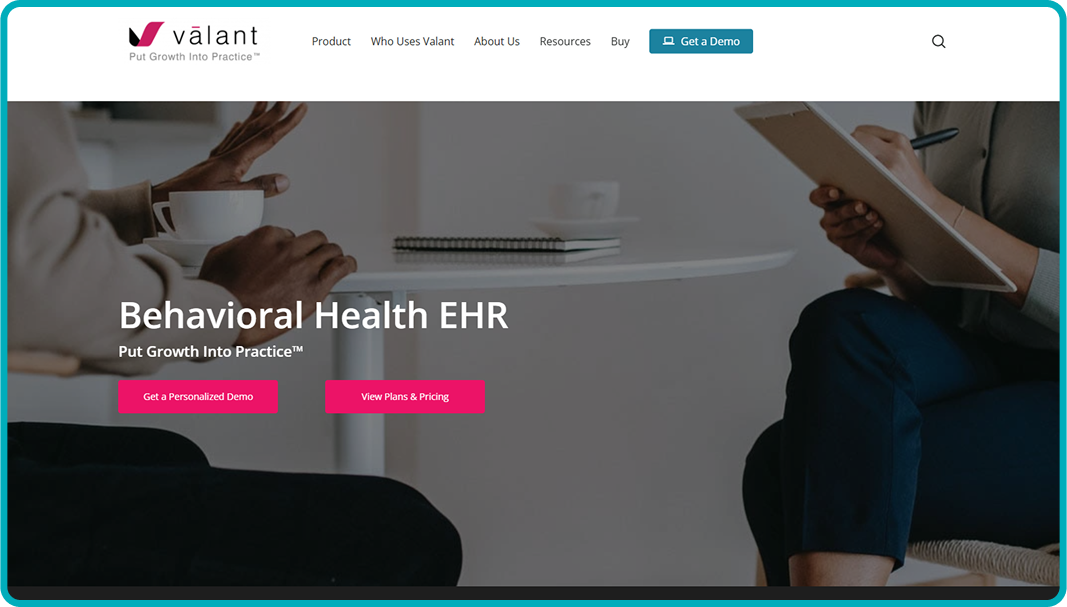
Valant is a cloud first mental health EHR that specializes in measurement based care and group therapy management.
Prominent Features:
- Automated intake and outcome assessments
- Group therapy workflow with individualized notes
- Real time dashboards and performance tracking
- Rules based patient matching and insurance validation
6. Welligent
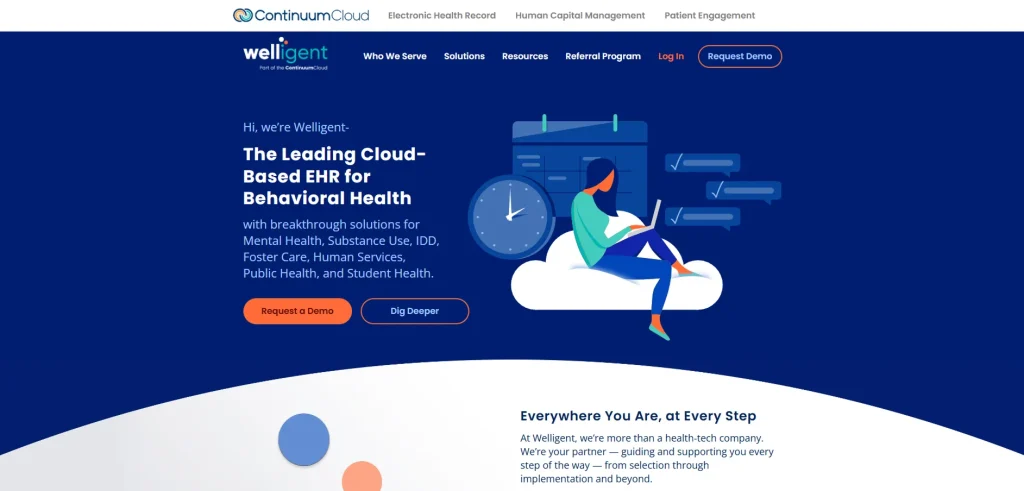
Welligent targets large behavioral health agencies, including SUD, foster care, and case management services.
Prominent Features:
- Multi service EHR functionality
- Scalable for agency level operations
- Customizable reporting and dashboards
- HIPAA and 42 CFR Part 2 compliance
7. TheraNest
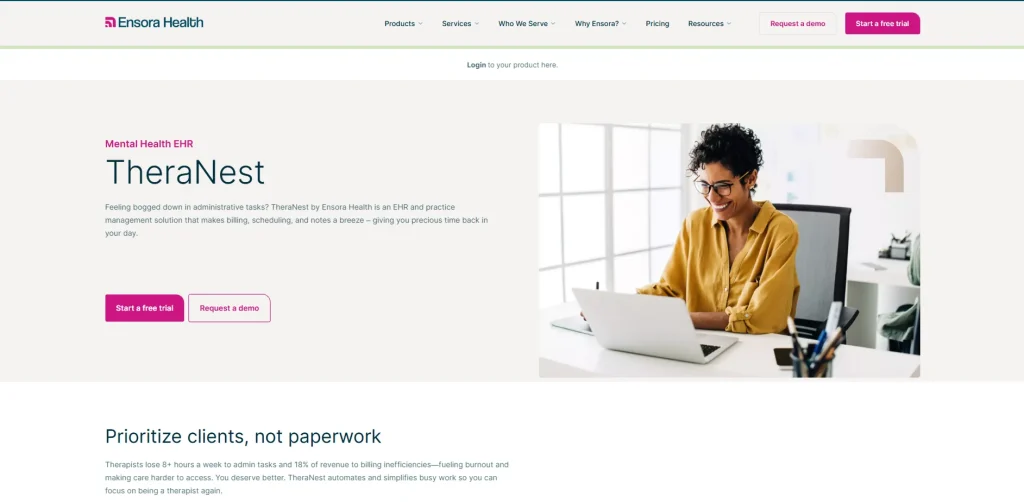
TheraNest focuses on small to mid-sized therapy practices, offering affordable, therapy first solutions.
Prominent Features:
- Telehealth and billing integrated
- Measurement based care support
- Mobile friendly client portal
- Session and progress note templates
8. Kareo Behavioral Health (now Tebra)
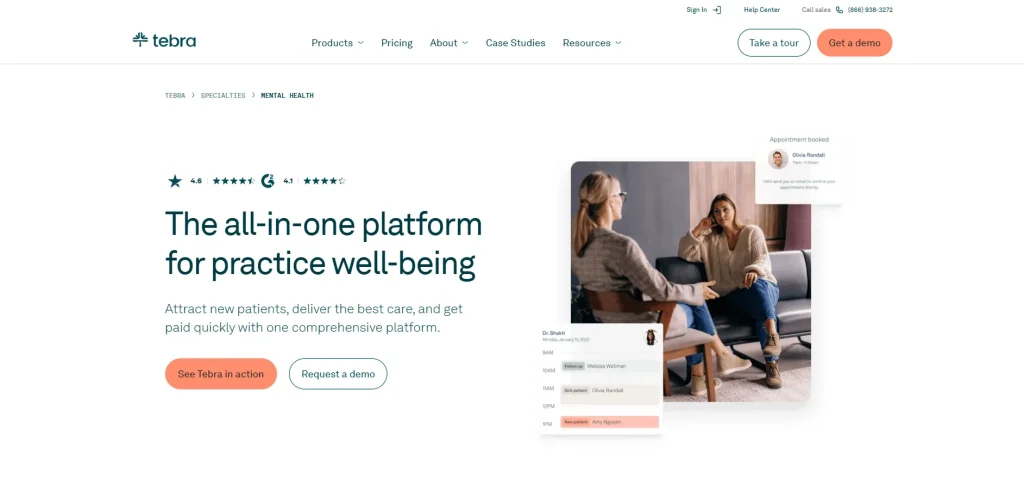
Kareo BH unites EHR, billing, and patient portal functionalities in a cloud based solution.
Prominent Features:
- Telehealth with HIPAA compliance
- Cloud/mobile access for clinicians and patients
- Integrated billing and scheduling
- Customizable templates
9. NextGen Behavioral Health
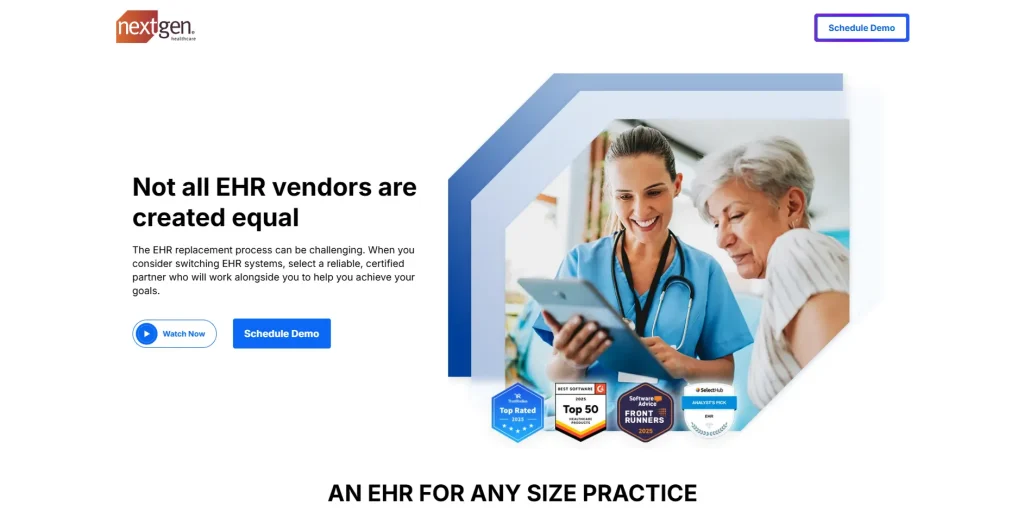
NextGen BH targets enterprise behavioral health practices, blending EHR functionality with population health analytics.
Prominent Features:
- Advanced reporting and dashboards
- Care coordination and workflow automation
- Telehealth and mobile access
- Measurement-based care tools
10. CareLogic EHR (now QUALIFACTS)
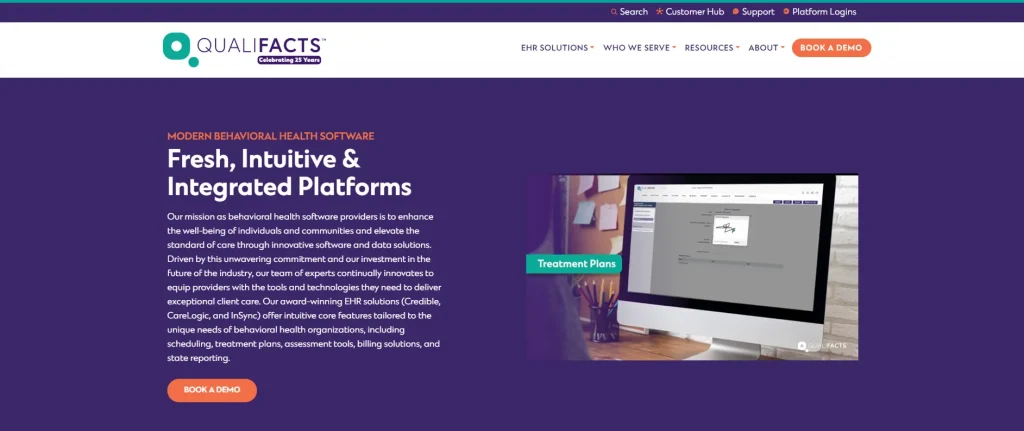
CareLogic focuses on complex behavioral health organizations, including multi location practices and agencies.
Prominent Features:
- Multi program EHR support (behavioral health, SUD, residential)
- Outcome tracking and automated reporting
- Scheduling, billing, and telehealth integration
- Compliance with HIPAA and 42 CFR Part 2
Take Action: Transform Your Mental Health Practice with us
Choosing the right EHR is a strategic investment in clinical efficiency, patient care, and compliance. With solutions like OmniMD leading the field, practices can streamline workflows, enhance telehealth, and improve patient outcomes while staying ahead in 2026’s rapidly evolving behavioral health landscape.Explore OmniMD today to discover how AI driven charting, telepsychiatry, and outcome focused features can redefine mental health care in your practice.
Disclaimer:
We’ve built this resource with healthcare professionals in mind, ensuring that it saves you time and offers clarity in your decision-making process. However, the comparison is based on independent research conducted by our team, leveraging publicly available information and vendor-provided resources. Features and pricing details may vary; we recommend reaching out to the respective vendors for the most accurate and up-to-date information.

Find Your Perfect-Fit Mental Health EHR
We break down the top EHRs built specifically for mental health professionals.
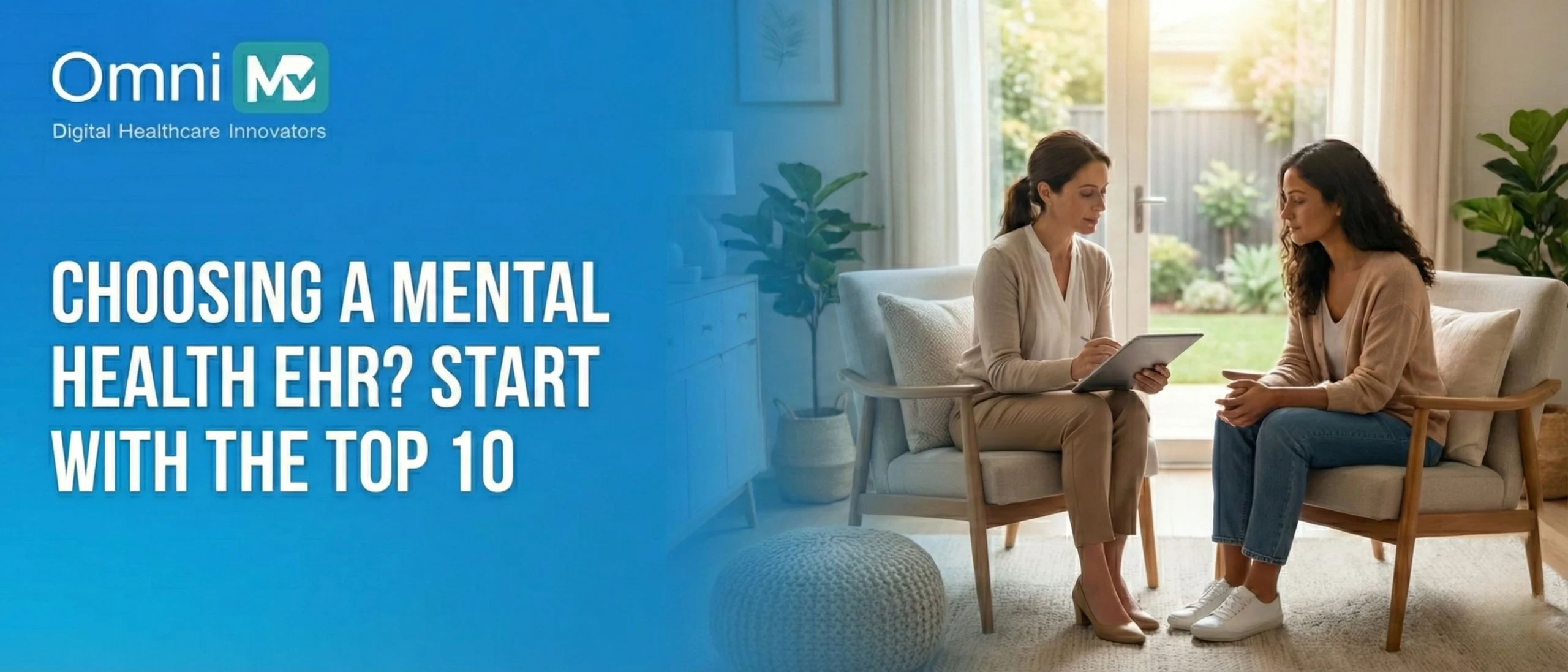
 Written by Divan Dave
Written by Divan Dave